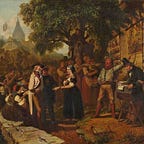Book Review
The Great War and the Predicament of American Democracy
The U.S. involvement in World War One unraveled the myth of exceptional American democracy as the Wilson administration unleashed a sweeping crackdown against dissent, German-Americans, and socialists on the home front.
With the slogan “to end all wars,” the U.S. entered the First World War during the presidency of Woodrow Wilson, who is still held in high regard among International Relations theorists as one of the early liberal interventionists in the service of a great cause. Wilson was seen as a Kantian idealist, whose intellectual erudite was recognized among his confidantes, pen pals, and the high-profile figures of the U.S. media in the early decades of the 20th century. While admirers and die-hard proponents of this former Princeton president lavishly place praise on his presidential record, Adam Hochschild’s recent book serves as a cautionary tale.
In a new book, Hochschild discards the myth that surrounds the much-vaunted presidency of Wilson, whose genuine attempts to make the U.S. an enforcer of a nascent League of Nations, the precursor to the United Nations following WWII, after the Great War crumbled in the face of a…
